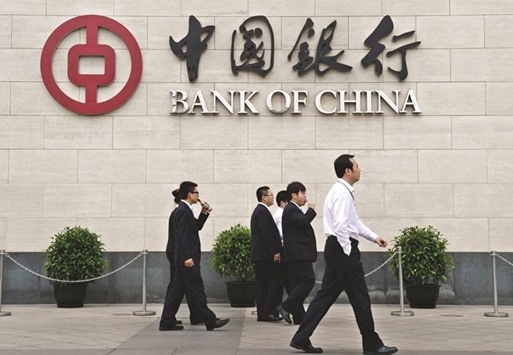China may approve as soon as this month a plan to make it easier for banks to convert soured debt into equity, according to a person with knowledge of the matter.
The government may allow conversions of as much as 1tn yuan ($155bn) of bad loans under the plan, said the person, who asked not to be named because the information isn’t public yet. Caixin magazine reported on the potential size of the conversions over the weekend.
“The progress of the loan-to-equity swap policy might be faster than expected,” Luo Yi, a Shenzhen-based analyst at Huatai Securities Co, wrote in a note yesterday. Conversions of that magnitude may reduce the banking industry’s non-performing ratio by one percentage point and may lift banks’ annual net profit by an average of 4%, according to Luo.
China’s policymakers are seeking ways to clean up mounting bad loans at the nation’s banks, which are at their highest levels in a decade amid slowing economic growth and government moves to curb overcapacity in manufacturing. Premier Li Keqiang said at last month’s National People’s Congress that the country may use debt-equity swaps to cut the leverage ratio of Chinese companies and to mitigate financial risks.
The Finance Ministry, the People’s Bank of China, and the China Banking Regulatory Commission didn’t immediately reply to faxed queries seeking comments yesterday.
Bad debt in China’s banking industry jumped 51% last year to 1.27tn yuan, data from the bank regulator show.
Mounting provisions for soured credit is crimping earnings growth at the largest banks and hurting their ability to pay dividends, profit reports showed last week. Industrial & Commercial Bank of China, Bank of China and Agricultural Bank of China posted their weakest annual profit growth in at least a decade, their filings showed.
China Construction Bank Corp’s 2015 net income barely increased.
Some of those lenders had previously expressed caution over the swap plan amid a lack of clarity about how exactly the government will proceed with the conversion of bad loans – owed to the banks mostly by state-owned enterprises – and also about the level of state support that will be available.
When asked about the proposal at the Boao Forum last month, Construction Bank chairman Wang Hongzhang said he needs to think of his shareholders and wouldn’t want to see a plan that simply converted “bad debt into bad equity.” Bank of China chairman Tian Guoli said at the same forum that it’s “hard to evaluate” how effective debt-equity swaps will be, as so much has changed in China since the tool was used to bail out the banking system during a previous crisis in the late 1990s.
At the time, government support came in the form of four special asset-management firms, which were set up with taxpayers’ money to buy about 1.4tn yuan of soured debt from the banks at face value. That protected the lenders from losses and relieved state-owned companies of their debt burdens.
About 30% of those bad loans were swapped into equity as directed by the government. China Huarong Asset Management Co, one of the four bad-loan managers, is actively pitching for a role in any new round of debt-equity conversion. The government should provide 1tn yuan to 3tn yuan of funding support, with banks, SOEs and asset managers sharing the risks, Lai Xiaomin, chairman of Huarong, said in a proposal to the top legislature last month.

Pedestrians walk past a Bank of China branch in Beijing. Bad debt in China’s banking industry jumped 51% last year to 1.27tn yuan, data from the banking regulator showed yesterday.
